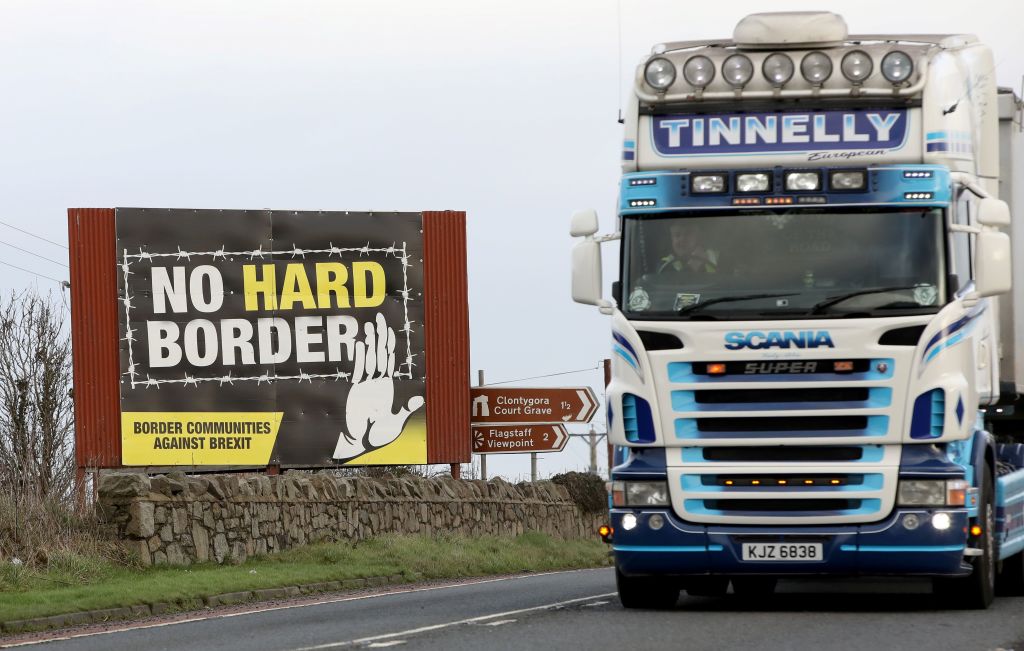
President-elect Joe Biden has said that the border between the Republic of Ireland and Northern Ireland must remain open no matter the outcome of Brexit negotiations between the U.K. and the European Union, as Ireland’s foreign minister suggested Biden would take any risk to the peace process “personally.”
The President-elect told reporters on Tuesday that a closed border between Ireland, an E.U. member state, and Northern Ireland, which is part of the U.K. “is just not right, we’ve got to keep the border open.” The dividing line was heavily militarized during the Northern Ireland conflict or “Troubles” and was opened after the historic Good Friday peace agreement was signed in 1998. Now, with Britain leaving the E.U., the prospect of border controls is again a reality. “We want to make sure – we’ve worked too long to get Ireland worked out, and I talked with the British prime minister, I talked with the Taoiseach [Irish Prime Minister], I talked with others, I talked to the French,” Biden said.
Biden’s remarks came after Ireland’s minister for foreign affairs Simon Coveney told TIME he believed the president-elect would not hesitate to use a mooted U.K.-U.S. trade deal as leverage to preserve the peace. If the U.K.’s departure from the E.U. undermines the Good Friday Agreement, Coveney said, Britain’s much sought-after trade agreement with the U.S. “simply won’t happen.”
British and European negotiators are currently locked in talks on trade relations after the U.K. completes its transition out of the bloc in January. At issue is the land border between the Republic of Ireland, which is an E.U. member, and Northern Ireland, which is part of the U.K. If the talks collapse without a deal, it raises the prospect of a hard border on the island to control customs — a move that governments in Ireland and Northern Ireland believe could enflame sectarian tensions.
A controversial bill introduced by the U.K. government in September would override the original terms of Britain’s withdrawal that ruled out customs controls along the Northern Irish border. In September, the E.U. leadership said that if the bill went ahead it would jeopardize the Good Friday Agreement and would be in “violation” of international law.
Coveney, who spoke to TIME on Nov. 20, predicted Biden’s administration would “look in a very critical way on a government or anyone who undermines the peace process on the island of Ireland … that would be a real problem for the U.S. and for Joe Biden personally.”
Read more: Brexit Has Revived the Prospect of a United Ireland. Could It Actually Happen?
In a memo published during his campaign, Biden — who traces his roots to Ireland — indicated support to the Irish government in relation to Brexit. Coveney said the Democrat’s election victory was a sign to Irish politicians that “we have many friends in Washington who see themselves as guarantors of the peace process in Northern Ireland.”
President Donald Trump has been a strong supporter of British Prime Minister Boris Johnson, and saw the Brexit vote as an expression of the same political fervor that initially brought him to office — during his 2016 campaign, he went as far as far as calling himself “Mr Brexit.” The prospect of Trump offering the U.K. a favorable bilateral trade deal with the U.S. post-Brexit emboldened Johnson’s hardline stance on the Brexit negotiations.
Coveney said that Biden might better grasp the Irish perspective. The president-elect “knows and understands the complexity of Irish politics better than most do in Washington and is very personally connected.”
However, he said he did not believe Biden was choosing to support Ireland over the U.K. “People shouldn’t confuse Joe Biden’s pro-Irishness as being in any way anti-British,” he added. “I think Joe Biden as a president will be very pro the U.K., I think the special relationship between the US and the UK will continue to be a special relationship but I also think the special relationship between Ireland and the United States will be reinforced.”
Biden has often referred to his Irish heritage and his great-great-great-grandfather Edward Blewitt left the town of Ballina, County Mayo, for America during the Irish famine 170 years ago. The town of Ballina celebrated his election win by erecting a mural of the President-elect. Biden visited the town as Vice President in 2016 and Coveney said he is sure he will visit again as President. “I know he will want to visit the communities he is linked with directly,” says Coveney. “He has already said he will visit Ireland during his presidency but of course we would encourage him to come as early as possible.”
Coveney says that Ireland’s influence within Europe could be of particular benefit to the U.S. as Biden will have to attempt to rebuild relationships after four years of the Trump administration’s policy of putting “America First” and diminishing multilateral alliances. “Ireland can be a bridge both politically and physically to build that transatlantic relationship in a very positive way,” says Coveney.
While Ireland enjoyed a relatively good relationship with President Trump, Coveney said, the President’s position on international relations and particularly international bodies was “hugely disturbing.” Coveney added that he hopes to see the U.S. “begin to come back to the forefront of collective global efforts in so many collective global challenges,” from tackling the COVID-19 pandemic to rebuilding international commerce or climate change.
More Must-Reads from TIME
- Cybersecurity Experts Are Sounding the Alarm on DOGE
- Meet the 2025 Women of the Year
- The Harsh Truth About Disability Inclusion
- Why Do More Young Adults Have Cancer?
- Colman Domingo Leads With Radical Love
- How to Get Better at Doing Things Alone
- Michelle Zauner Stares Down the Darkness
Contact us at letters@time.com